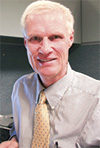The news out of Africa was not good. Ambassador Christopher Stevens was killed at the U.S. Consulate in Benghazi, Libya. Three of his colleagues were killed as well. The event is developing as I write, but let me share with you a perspective. The diplomatic corps is but a fraction of the size of the U.S. military. Their efforts are diplomacy and development, whereas our military personnel work in the defense of our country and its interests. The diplomatic corps are generally foreign service officers, spending most of their time overseas.
Most of the assignments are accompanied; they bring their families and their children and adapt to the host country. By and large, accompanied posts are safe and secure – although certainly the word complacency is not in the operational vernacular of the diplomats.
Some posts are unaccompanied. I served on four of them: Afghanistan, Iraq, Pakistan and South Sudan. These are posts where embassy staff serve without family. Generally these posts are listed as less secure and less safe than those, say, in Paris or London or Mexico City.
The embassy staff are protected by the regional security officers (RSO). The RSO are diplomatic security officers, whose job it is to protect the diplomat, safeguard the embassy assets and conduct intelligence to thwart any harm that may come to U.S. government interests.
During my four years of posting at embassies, the RSO did their job superbly. And in all four countries I listed above, if the RSO said we cannot leave the embassy compound, we did not. There was no ambiguity with their decision.
The challenge, of course, is that during extended times of security concern and limited access out of the compound, diplomats are less able to engage the local population and host government political leadership. Without question, the one constraint we all have is our ability to move about outside of the compound … and do the work of diplomacy and development.
The challenge is obvious: What level of risk is acceptable for travel in a less secure country by diplomats and developmental officers? Few countries have the assets of a U.S. military like we had, and still have, today in Afghanistan – or had in Iraq.
So the risk question is also an operational question: To what extent can a trip off-compound (the embassy) be justified if the RSO lacks the manpower to support the movement at an acceptable level of risk? Trust me, every RSO officer weighs these risks and decisions carefully, every day.
At some point, though, we find ourselves in a situation or predicament that we did not expect. The use of diplomacy and development assumes a relatively peaceful and safe environment – if not, then we have those with weapons taking the lead.
Yet those of us in dress shoes and not combat boots do understand the risks of being in an environment completely foreign to our own back home in the U.S. We utilize the skills of situational awareness, watching out for each other and always having an egress plan should the unexpected become manifest.
For Ambassador Stevens and his colleagues, the unexpected occurred with tragic results. In spite of our best heightened sense of awareness, precaution and risk evaluation by very dedicated security officers, we simply cannot control those who chose to pick a moment in time and do harm against us.
Another way to write this is: Those that seek to harm us only have to pick one moment in time; those who protect us and evaluate the day-to-day risks must do so every day and 24 hours a day. I have extreme appreciation for the many dedicated RSO officers who kept me out of harm’s way.
Yes, at times schedules were changed and we fussed about not getting outside the gate. But I have no idea how many times this fussing was minor as compared to possibly being harmed or killed.
The public service of the foreign service officer is extraordinary, and I submit does not get the attention it deserves. The diplomatic and development model is far less expensive than using our U.S. military. The challenge is, of course, engaging the host national government when conditions on the ground are not quite peaceful but not quite defined by a combat battle space.
The goals are admirable … using diplomacy and development to help a host national government toward joining the international community of good governance; a fair and equitable justice system, the freedoms of thought, religion and human rights; and the economic growth that will enable a country to increase its gross national product so its people can better the quality of their lives.
Tall order, I know. And this is why diplomacy and development cannot be shaped in the context of a combat battlefield. These are done over the long haul and, from my perspective, much of it is done by listening, learning, mentoring and then helping our contacts with the host national government. One obvious end state is economic development through the private sector.
One example is rather than ship cereal grains to a country year after year (entitlement), we help the local farmers grow it themselves (empowerment). Someday they will buy a John Deere tractor or build a processing plant, therefore moving beyond subsistence farming.
It is a sad day for the State Department . I have many colleagues grieving for this loss because we expect to do our work as diplomats and development officers in a safe and welcome environment. Some say that if a country is not safe enough to send diplomats and development officers, we ought not to be there.
My response is simple: Rather than be afraid and retrench to the relatively safe shores of our country, like soldiers and diplomats and development officers, we go to foreign lands to serve our country at the request of the commander-in-chief. Engagement in the world many time zones away is difficult, it is unpredictable, and engagement is usually messy. Yet we go.
This calling is not for everyone. I enjoyed my deployments and find myself constantly thinking about our way of life here … and that we not take this life for granted.
The four American lives lost in Libya are tragic. They are the best of us … going into foreign lands and trying to help a host national government better serve its people. In doing so, they are bringing the very freedoms and rights and liberties by example and by manifest action.
I say a deeper prayer today for all those overseas and for their families at home here praying for their safety and well-being. When they come home, they do so for a while, until the call to service comes again.
Then they go again. PD

Mike Gangwer
Senior Agricultural Adviser
USDA FAS






